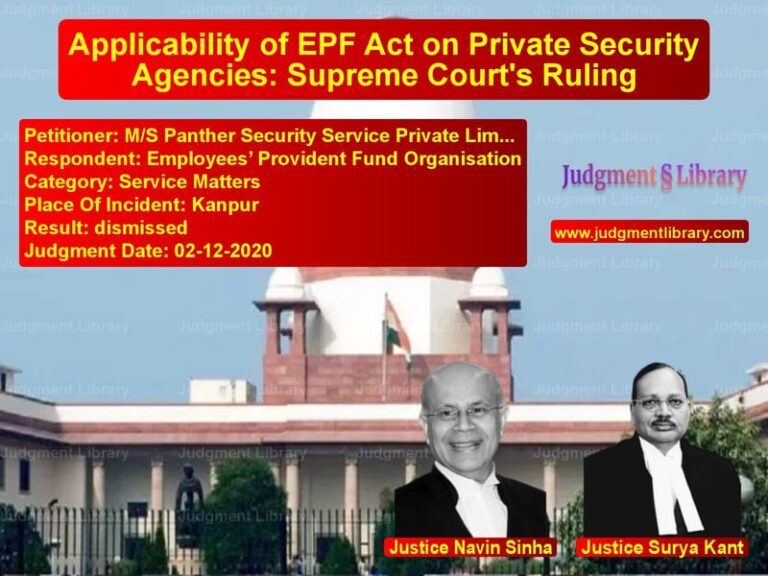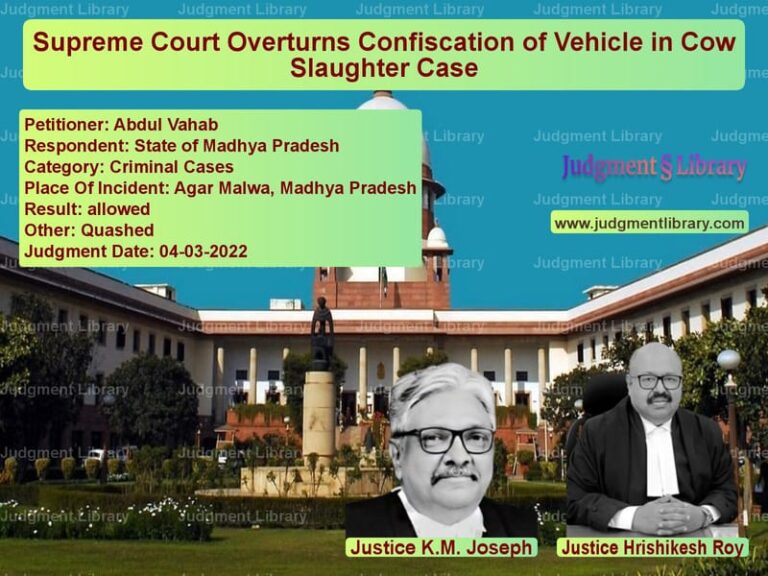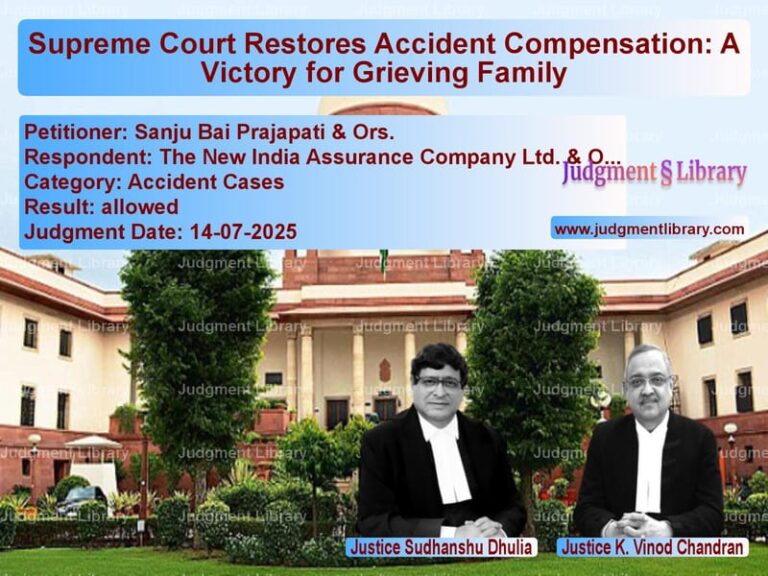Election Petition and the Impact of False Declarations in Affidavits on Municipal Elections
The case of S. Rukmini Madegowda v. The State Election Commission & Ors. addresses the issue of false declarations in election affidavits, specifically regarding the non-disclosure of assets by a candidate and the implications this has on the validity of an election. The appellant, S. Rukmini Madegowda, contested the decision of the High Court, which upheld the judgment of the Trial Court setting aside her election to the Mysore Municipal Corporation. The case touches on the legal requirement for candidates to disclose their assets and the consequences of failing to do so, specifically in the context of local body elections governed by the Karnataka Municipal Corporation Act, 1976.
Background of the Case
The appellant, S. Rukmini Madegowda, filed her nomination to contest elections for the Mysore Municipal Corporation as a candidate for Ward No.36 (Yeraganahalli), a seat reserved for backward class women. The appellant submitted her nomination along with an affidavit declaring her assets, as required by the Karnataka Municipal Corporation (KMC) Act. The affidavit, however, contained false information, particularly regarding her husband’s assets. This led the respondent, an unsuccessful candidate, to file an election petition under the KMC Act, alleging corrupt practices.
The key issue in this case revolves around whether the appellant’s false declaration regarding her husband’s assets constitutes a corrupt practice under the KMC Act and whether this affects the validity of her election. The respondent argued that the appellant’s non-disclosure of her husband’s assets was not only a violation of the disclosure requirement but also an attempt to mislead the electorate, thereby impacting the election result.
Legal Issues
- Whether the false declaration in the affidavit regarding the assets of the appellant’s spouse constitutes a corrupt practice?
- Does the failure to disclose such assets affect the validity of the election under the Karnataka Municipal Corporation Act?
- Whether the State Election Commission had the authority to issue the notification requiring disclosure of such assets?
Arguments by the Appellant (S. Rukmini Madegowda)
The appellant, represented by Mr. Shyam Diwan, argued that:
- There is no specific provision in the KMC Act or the KMC Election Rules that requires a candidate to disclose the assets of their spouse. Therefore, the appellant cannot be held accountable for not disclosing her husband’s assets.
- The appellant’s affidavit was filed in accordance with the existing legal framework and did not violate any statutory provisions. The incorrect statement regarding her husband’s assets was unintentional.
- There was no material impact on the election outcome because the appellant won the election by a substantial margin, receiving 3295 votes as compared to the 2902 votes received by the respondent.
- The Election Commission did not have the power to mandate the disclosure of assets of a candidate’s spouse and depended on an advisory notification, which was not legally binding.
Arguments by the Respondent (State Election Commission and Others)
The respondents, represented by Mr. Basava Prabhu S. Patil, contended that:
- They were unaware of the fraudulent nature of the sale deeds until 2015, when they discovered that the documents had been obtained by fraud and misrepresentation.
- They had filed the suits promptly after discovering the fraud, invoking Section 17 of the Limitation Act, which allows for the extension of the limitation period based on the discovery of fraud.
- The delay in filing the suit was not due to negligence but because they only realized the fraudulent actions of the appellant after visiting the suit property.
Supreme Court’s Observations
The bench, comprising Justice Indira Banerjee, Justice Ajay Rastogi, and Justice Uday Umesh Lalit, made the following observations:
1. Definition of Corrupt Practices
The Court reiterated the definition of corrupt practices as per the KMC Act and the Representation of People Act. It noted that failure to disclose assets, particularly those of a candidate’s spouse, could be categorized as ‘undue influence,’ a form of corrupt practice that influences voters’ free and fair choice:
“A false declaration regarding assets constitutes undue influence. Even if the candidate did not have the intention to influence voters, the suppression of material facts must be viewed as a corrupt practice.”
2. The Role of Election Commission
The Court affirmed the role of the State Election Commission in ensuring the transparency of the election process. It observed that the notifications issued by the Election Commission requiring candidates to disclose their assets, including those of their spouses, were within the constitutional framework:
“The Election Commission has the power to issue guidelines and notifications to ensure free and fair elections, even if the specific statutory provisions do not require such disclosures. The power vested in the Election Commission under Articles 243K and 243ZA of the Constitution provides it with the necessary authority.”
3. The Impact of Non-Disclosure on Election
The Court held that the non-disclosure of assets, particularly those of a candidate’s spouse, could affect the integrity of the electoral process:
“The non-disclosure of assets directly impacts the transparency of the election. It is not necessary for the non-disclosure to have a quantifiable effect on the election results. The act of withholding material information is sufficient to vitiate the election.”
Final Judgment
The Supreme Court dismissed the appeal, upholding the decision of the High Court and the Trial Court. The appellant’s election was set aside due to the false declaration made in her affidavit regarding the assets of her spouse. The Court directed that the appellant’s election as Councillor for Ward No.36-Yeraganahalli be declared void.
Key Takeaways from the Judgment
1. Importance of Transparency in Election Disclosures
This case reinforces the need for complete transparency in the election process, including the full disclosure of candidates’ assets and liabilities, and those of their spouses and dependents.
2. Election Law and Corrupt Practices
The judgment clarifies that non-disclosure of relevant financial information can amount to a corrupt practice, which has a direct impact on the validity of the election.
3. Role of Election Commission in Ensuring Fairness
The Court confirmed that the Election Commission has the authority to issue guidelines and notifications that ensure a fair election process, even if these go beyond the specific provisions of the law.
Conclusion
The Supreme Court’s decision in S. Rukmini Madegowda v. The State Election Commission & Ors. highlights the importance of adhering to legal requirements for transparency in elections. It emphasizes the role of the Election Commission in promoting a fair and honest electoral process, and affirms that any attempt to suppress material information, even unintentionally, constitutes corrupt practice and can lead to the annulment of an election.
Petitioner Name: S. Rukmini Madegowda.Respondent Name: State Election Commission & Ors..Judgment By: Justice Indira Banerjee, Justice Ajay Rastogi, Justice Uday Umesh Lalit.Place Of Incident: Mysore, Karnataka.Judgment Date: 14-09-2022.
Don’t miss out on the full details! Download the complete judgment in PDF format below and gain valuable insights instantly!
Download Judgment: s.-rukmini-madegowda-vs-state-election-commi-supreme-court-of-india-judgment-dated-14-09-2022.pdf
Directly Download Judgment: Directly download this Judgment
See all petitions in Fundamental Rights
See all petitions in Legislative Powers
See all petitions in Judgment by Indira Banerjee
See all petitions in Judgment by Ajay Rastogi
See all petitions in Judgment by Uday Umesh Lalit
See all petitions in dismissed
See all petitions in Quashed
See all petitions in supreme court of India judgments September 2022
See all petitions in 2022 judgments
See all posts in Election and Political Cases Category
See all allowed petitions in Election and Political Cases Category
See all Dismissed petitions in Election and Political Cases Category
See all partially allowed petitions in Election and Political Cases Category







